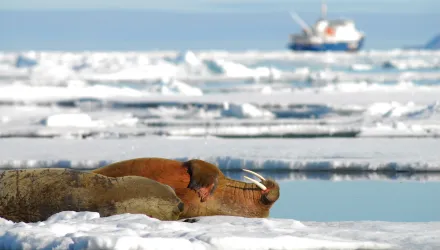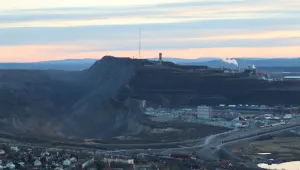
In March 2022, seven of the eight Arctic states announced an unprecedented pause in the operations of the Arctic Council, the leading intergovernmental forum for cooperation in the region, in protest of Russia’s invasion of Ukraine. The pause came during the middle of Russia’s two-year Chairship of the Council – and during a period when the region is experiencing radical environmental and social transformation driven by climate change.
After more than a year’s hiatus, Norway will take over the Chairship of the Arctic Council from Russia on May 11 as scheduled, raising hopes that the Council’s work on the most pressing issues facing the region will soon resume in some capacity.
We sat down with Fran Ulmer, Senior Fellow with the Belfer Center’s Arctic Initiative, to understand what we might expect from the transition, as well as possible paths forward for the Arctic Council and Arctic governance more broadly. This transcript has been edited for clarity and length.
A lot of attention is being placed on the May 11 transition of the Arctic Council Chairship from Russia to Norway as a chance to bring the Arctic Council back to life. From your perspective, how important is this transition for the future of the Arctic Council?
Fran Ulmer: For the 27 years of the Arctic Council’s existence, the leadership transition has always been fairly orderly, following a prescribed schedule of two-year Chairship rotations. Compared to past transitions – big ministerials with lots of media and many people in attendance – the handoff of the Chairship from Russia to Norway will be a very quiet affair. The ceremony will be held completely online with only a limited number of official participants. Although it will be very different, it's still very important because it continues a long tradition of an orderly transition, preserving continuity and enabling the Arctic Council to function.
As Norway’s Senior Arctic Official, Ambassador Morten Høglund has said in recent statements, the most important outcome of Norway’s Chairship is to ensure that the Arctic Council survives. So this transition event demonstrates that the Arctic Council is still alive, even though it has changed.
What is the worst-case scenario if the transition does not go smoothly?
Ulmer: Since the ceremony is being held online, instead of in-person, it is likely to go smoothly. The only potential awkward situation would be if Russia’s representative decided to lecture the other Arctic Council Members about – for example - excluding Russians from participating in the work of the Council or the expansion of NATO. It’s possible that Russia will make such a statement, but it won’t change the fact of the transition. Because of the virtual format that is being used, that wouldn’t undermine the ability of participants to proceed with the transition to Norway.

What are the things you have been looking out for during the lead-up to the transition? In the weeks following?
Ulmer: Norway already announced their priorities and, unsurprisingly, they are very similar to the priorities of previous Chairships: climate, the environment, oceans, sustainable economic development, the people of the Arctic. So it’s reassuring that Norway is demonstrating that the Arctic Council’s focus areas over the last two decades remain important.
I expect Norway will clarify their agenda with more specifics. They've mentioned a few issues in their recent statements - for example, under the oceans agenda, they plan to address marine litter, plastic pollution, and emergency prevention and preparedness. Arctic Council Members, Permanent Participants, and Observers can make headway on those issues even if Russia is not participating. Clearly, the Arctic Seven are not bound to wait for Russia to come back out of the penalty box before progress can be made.
Now, it's true there is no way of binding Russia to whatever the other seven Arctic states might agree on, but that's how it's always been. The Arctic Council is an international governmental forum; it is not a treaty-based organization with binding authority of any kind. So what I’m hoping for, is that under Norway’s leadership - which I have no doubt will be excellent, because they always commit the resources to participate fully – Arctic Council Working Groups will focus on specific agenda items in ways that make progress.
So you expect to see the most progress at the sub-regional or country level?
Ulmer: Yes, but even at the regional level, there’s a lot that can be done with Russia out of the picture. In the North American region, there’s a set of Arctic Ocean issues shared by Alaska, Canada, Greenland, and Iceland. Similar issues around fisheries and marine safety exist in the European Arctic. It would be nice to have Russia at the table, but even without them, it would be useful to discuss challenges, and share research, best practices, and cross-border solutions.
When you look at Norway's recently released program for its Chairship of the Arctic Council, what are the priorities that really stand out to you as most urgent or important? Where do you think they have the most opportunity to get traction? What elements do you think might be more challenging?
Ulmer: Clearly, oceans are an opportunity zone for a lot of reasons: there are many indicators of how much change is underway, and there’s growing concern about fisheries conflicts as fish move north. The existing fisheries agreements - which were established not under the Arctic Council, but through other treaty mechanisms - may need fine-tuning because of the way in which the ecosystems are changing. Even though the Arctic Council doesn't have legal authority over fisheries, it could be an ideal forum for sharing science, knowledge, and experience, as well as fostering less confrontational dialogue. When discussions take place in a neutral forum (as opposed to a decision-making body), there’s an opportunity for more open and creative problem-solving.
Clearly, the Arctic Seven are not bound to wait for Russia to come back out of the penalty box before progress can be made.
Another important function of the Arctic Council is to bring attention to the Arctic as a place where drastic change is happening and having a big impact, not only locally but globally. We shouldn’t lose track of that. Arctic Council work provides a mechanism of keeping the Arctic at the forefront of people’s minds when decisions are being made in other international bodies. That is another important role I hope the Norwegian Chairship will continue to prioritize.
As far as challenging topics go, Norway has indicated plans to work on sustainable economic development by promoting dialogue on some challenging issues; for example: the environmental concerns around mining for critical minerals needed for a clean energy transition. In a lot of places, people don’t want mining, and we've seen major mining proposals get shut down in Canada, Greenland, and Alaska. And yet, minerals are essential to many of the technologies that make a transition away from fossil fuels possible. Norway has mentioned that tradeoff as something part of their agenda, which is definitely a thorny issue.
What else has been top of mind for you as this Chairship transition approaches?
Ulmer: In 2019, Ambassador David Balton and I wrote a paper about adjustments the Arctic Council could make to its operations and structure to strengthen itself. It was published before the invasion of Ukraine and did not focus on Russia. We were simply exploring this question: what could the Arctic Council do to be a more effective organization and improve cooperation in the Arctic?
We discussed a number of recommendations that could be feasible even under current circumstances. Developing a strategic plan that prioritizes work beyond a single Chairship, for example. Under the current practice of changing the Chairship every two years, each country announces a new agenda. Yes, it's usually quite similar to the previous agendas, but in a way it creates an interruption, a reset. At the same time, the Working Groups have other projects they're still working on. As a result, there are too many projects spread across the organization with little clarity about which ones are most important. Where should the Council’s limited resources be spent? Where do the six Working Groups’ efforts overlap? The Arctic Council released its first strategic plan in 2021, and it will be important for Norway to continue efforts to operationalize this strategy, and if possible, streamline operations.
Similarly, in my opinion, there’s no point in waiting to clarify the role and responsibilities of Observers - how they impact decisions, where they can be engaged, how they can contribute both financially and in terms of their expertise. There have been some efforts at clarification, but it's still pretty muddy, to both the general public and, probably, to a lot of Observers.
One final change I’d like to see is a new requirement for Member states to report on their progress. Right now, countries do not have to report on their implementation of major commitments undertaken through the Arctic Council. There's little accountability. That’s implicit in the fact that the Arctic Council is not an enforcement agency, but it would be good to have some sort of annual or biannual indication from countries that they are actually considering and operationalizing some of the recommendations that come out of the Arctic Council’s work.
It’s clear that it won’t be “business as usual” for the Arctic Council as long as Russia is attacking Ukraine; but why should operational questions be shelved until then, when they could be advanced or at least seriously discussed now? I hope that under the Norwegian Chairship progress can be made.
“The Arctic Council in Transition: An Interview with Fran Ulmer.” Hanlon, Elizabeth, ed. Belfer Center for Science and International Affairs, Harvard Kennedy School, May 8, 2023






